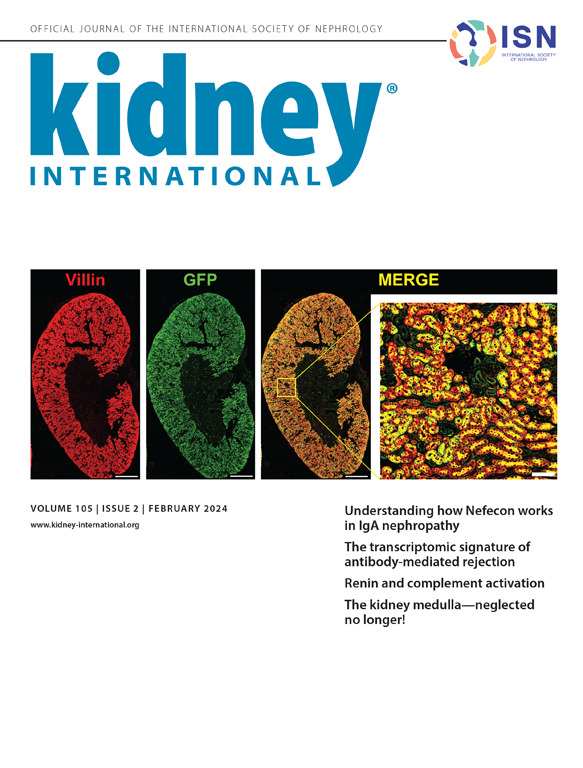代谢紊乱相关肾脏疾病的基因研究。
IF 14.8
1区 医学
Q1 UROLOGY & NEPHROLOGY
引用次数: 0
摘要
糖尿病肾病(DKD)和肥胖相关性肾病是代谢性疾病相关慢性肾脏疾病的代表。全基因组关联研究(GWAS)已被广泛开展,大量已证实的基因座已被确定与许多常见疾病或数量性状相关,包括2型糖尿病、肥胖和慢性肾脏疾病。相比之下,用于DKD的GWAS鉴定了有限数量的易感位点,并且这些位点在独立研究中的可靠复制尚未完成。截至2024年,还没有关于肥胖相关肾脏疾病的GWAS报道。因此,关于DKD或肥胖相关肾脏疾病的遗传学研究并没有提供令人满意的结果。然而,通过使用多性状GWAS数据进行的遗传相关研究和孟德尔随机化研究表明,DKD、肥胖相关肾脏疾病和肥胖具有共同的遗传机制。由于肥胖或超重是一种可逆的状况,有效的减轻体重的干预措施可能不仅有助于预防肥胖相关肾脏疾病的发生,还有助于预防DKD或其他类型的慢性肾脏疾病的发生。进一步的遗传学研究对于了解DKD和肥胖相关肾脏疾病的遗传结构是必要的,并且应该扩大。本文章由计算机程序翻译,如有差异,请以英文原文为准。
Genetic studies on metabolic disorder associated kidney diseases.
Diabetic kidney disease (DKD) and obesity-related kidney diseases are the representative chronic kidney diseases related to metabolic disorders. Genome-wide association studies (GWAS) have been extensively performed, and a substantial number of confirmed loci have been identified to be associated with many common diseases or quantitative traits, including type 2 diabetes, obesity, and chronic kidney diseases. By contrast, GWAS for DKD have identified limited number of susceptible loci, and the robust replication of these loci in independent studies has not yet been accomplished. As of 2024, no GWAS have been reported on obesity-related kidney diseases. Therefore, the genetic studies on DKD or obesity-related kidney diseases have not provided satisfiable results. However, by genetic correlation studies and Mendelian Randomization studies, that were performed using multi-traits GWAS data suggested that DKD, obesity-related kidney diseases, and obesity share common genetic mechanisms. Since obesity or overweight is a reversible condition, the effective interventions to reduce body weights might contribute to the prevention of the development of not only obesity-related kidney diseases, but also DKD or other types of chronic kidney diseases. Further genetic studies are necessary to understand the genetic architecture of DKD and obesity-related kidney diseases, and should be expanded.
求助全文
通过发布文献求助,成功后即可免费获取论文全文。
去求助
来源期刊

Kidney international
医学-泌尿学与肾脏学
CiteScore
23.30
自引率
3.10%
发文量
490
审稿时长
3-6 weeks
期刊介绍:
Kidney International (KI), the official journal of the International Society of Nephrology, is led by Dr. Pierre Ronco (Paris, France) and stands as one of nephrology's most cited and esteemed publications worldwide.
KI provides exceptional benefits for both readers and authors, featuring highly cited original articles, focused reviews, cutting-edge imaging techniques, and lively discussions on controversial topics.
The journal is dedicated to kidney research, serving researchers, clinical investigators, and practicing nephrologists.
 求助内容:
求助内容: 应助结果提醒方式:
应助结果提醒方式:


